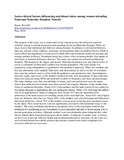| dc.description.abstract | The purpose of the study was to understand social cultural factors that influence maternal nutrition among women in perinatal period attending Pumwani Maternity Hospital. There are many factors that determine diet behavior among humans. In addition to personal preferences, there are cultural, social, religious, economic, environmental, and even political factors. Little is known about the magnitude of social factors which affect the nutritional intake in expectant and nursing mothers in Kenya. Nutritional intake has a direct effect on human health. Poor intake of food leads to nutrition deficiency diseases.
The study was carried out at Pumwani Maternity Hospital. This hospital is the largest and busiest. Maternity hospital in east and central Africa. It serves a catchment of about half a million low income population. The study design was exploratory using triangulation of quantitative and qualitative approach. Thirty five mothers and five key informants were sampled. Interviews and observations as well as review of secondary data were the methods used to collect both the qualitative and quantitative data. Questionnaire, interview guide, and review of the mother's medical records were instruments of data collection. Data were analyzed using SPSS and presented in tables of frequency, pie chart and percentages.
The main findings were that, unavailability of money and food preferences were the major factors that influenced food intake more than cultural and religion. Majority of the mothers had forms of nutritional disorders. Nearly 63% of the mothers said the main reason for not taking for not taking adequate or appropriate diet was inadequate money. About 23% cited large household size as an impediment to intake of adequate food. Nearly 91% percent mentioned food preference as the main reason of excluding certain foods from their diet. About 83% said religion does not influence what they eat. Nearly 60% of the mothers said cultural background influenced their food preference. About 54% of the mothers were assessed as having poor nutritional status by the nurse. Most social factors were not significantly associated with nutritional status of the mothers.
The study concluded that the poor nutritional status of the respondent could be due attributed low purchasing power occasioned by poor education and lack of better paying jobs or income generating activities. Although mothers were knowledgeable about balanced diet, other factors impede them from practicing good dietary habits of adequate of quality food. A refocus on best ways to provide effective health and nutritional education is necessary. In the wake of a rise in female headed household, policies that insulate women from unfair competition for resources with men are necessary. | en_US |

